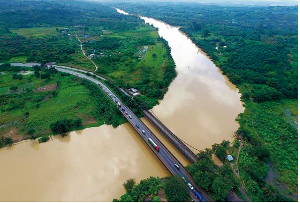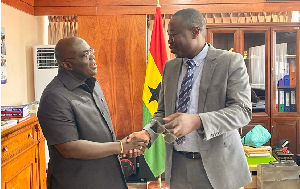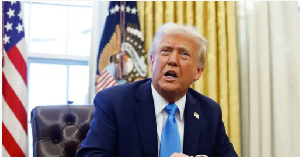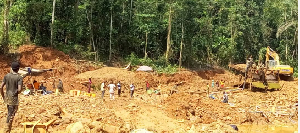Ghana, a nation celebrated for its rich biodiversity and efforts in reforestation, is facing an environmental crisis of unprecedented scale. Recent reports, including a compelling TV3 broadcast on August 31, 2024, reveal the devastating impact of unchecked mining activities on our protected forest reserves and water bodies.
Thirty-eight forest reserves have already fallen victim to illegal mining, commonly known as ‘galamsey’, with many of these operations dangerously close to vital water sources. This environmental degradation threatens not only
our biodiversity but also food security, public health, and the water systems that sustain life in Ghana.
As a climate action enthusiast committed to environmental stewardship, I find it alarming that while Ghana’s Green Ghana Project receives international acclaim, the government’s actions, particularly through Legislative Instrument (L.I.) 2462, tell a different story. This legislation, rather than protecting our environment, has facilitated its destruction. It’s time we confront this contradiction and call for immediate action.
Ghana’s Green Ghana Project, initiated to restore our dwindling forest cover, has been widely praised. However, this commendable effort is being undermined by L.I. 2462, a legislative instrument that permits mining in biodiversity hotspots under the vague justification of "national interest." This decision-making power, vested solely in the presidency, has led to the approval of over eight mining leases in ecologically sensitive areas. Forests that once thrived, like Anhwiaso East, Boin Tano, Upper Wassa, and Apamprama reserves, are now barren landscapes. The Draw River Forest Reserve in the Western Region, established in 1954, has become the latest casualty.
This isn’t just about trees; it’s about the very ecosystems that these forests support. The loss of these natural resources accelerates our environmental decline and poses a direct threat to our future.
The destruction doesn’t stop at the forests. Our water bodies, essential for human survival and ecological balance, are also under siege. Despite being marked as "red zones" by the sector minister, illegal mining continues unabated. The Minerals Commission’s decision to issue licenses in 2022 and 2023, overlapping with critical water bodies, has exacerbated the problem. Rivers like Ankobra, Pra, Tano, and Ofin, lifelines for countless communities, are
now at grave risk.
For instance, the Pra and Ankobra rivers, two of Ghana’s most significant water sources, have suffered immensely due to illegal mining. The Central Regional Office of the Ghana Water Company reports that mining in the Pra River has drastically reduced the intake of raw water at treatment plants, compromising water quality for the people of Cape Coast and Elmina. Sedimentation has clogged about 60% of the river’s catchment area, resulting in a drastic increase in water turbidity, reaching 14,000 NTU (Nephelometric Turbidity Units), far
above the 2,000 NTU threshold necessary for effective treatment.
The environmental damage extends beyond forests and rivers, threatening our food security. The combination of forest destruction and a severe dry spell has decimated agricultural production across eight regions. In a desperate attempt to ensure domestic food security, the Ministry of Food and Agriculture has banned the export of grains, including maize, rice, and soybeans. Yet, this move comes too late for the 435,872 farmers who have already lost an estimated GH₵3.5 billion in investments due to prolonged dry conditions.
This financial blow, coupled with the continued contamination of water sources, severely endangers the availability and safety of food across the country.
Forests are more than just trees. They are vital to maintaining water quality, regulating water flow, and stabilizing our climate. They act as natural filters, trapping pollutants before they can enter rivers and streams. Their destruction doesn’t just impact the environment; it disrupts the very fabric of life for the communities that depend on these ecosystems.
Moreover, the contamination of water bodies with toxic chemicals like mercury and cyanide from mining activities poses a long-term public health risk. The Ghana Medical Association has already warned of potential health crises, including congenital malformations and various forms of cancer if these activities are not stopped.
It is clear that L.I. 2462, far from serving the national interest, has become a tool for environmental destruction. Ghana is losing over 3% of its forest cover annually, a rate that is not only unsustainable but also a direct threat to our nation’s ecological balance. Repealing L.I. 2462 is not just a policy change; it is a necessary step to protect our forests, water bodies, and future.
The forests of Ghana are our most powerful allies in the fight against climate change, acting as carbon sinks that absorb and store carbon dioxide. Allowing mining activities in these critical areas accelerates forest loss and undermines every effort we make to mitigate climate change. If we do not act now, the consequences will be dire.
Protecting our forests is about more than preserving natural beauty. It is about survival. Forests safeguard our water sources, ensure food security, and protect us from the worsening effects of climate change. The stakes could not be higher. Our environment, our economy, and our lives depend on it. The government must act now to repeal L.I. 2462 and secure our future.
Andrews Aibi Junior is a passionate climate action enthusiast dedicated to advocating for sustainable practices and environmental protection in Ghana and beyond.
Opinions of Friday, 6 September 2024
Columnist: Andrews Aibi Junior















